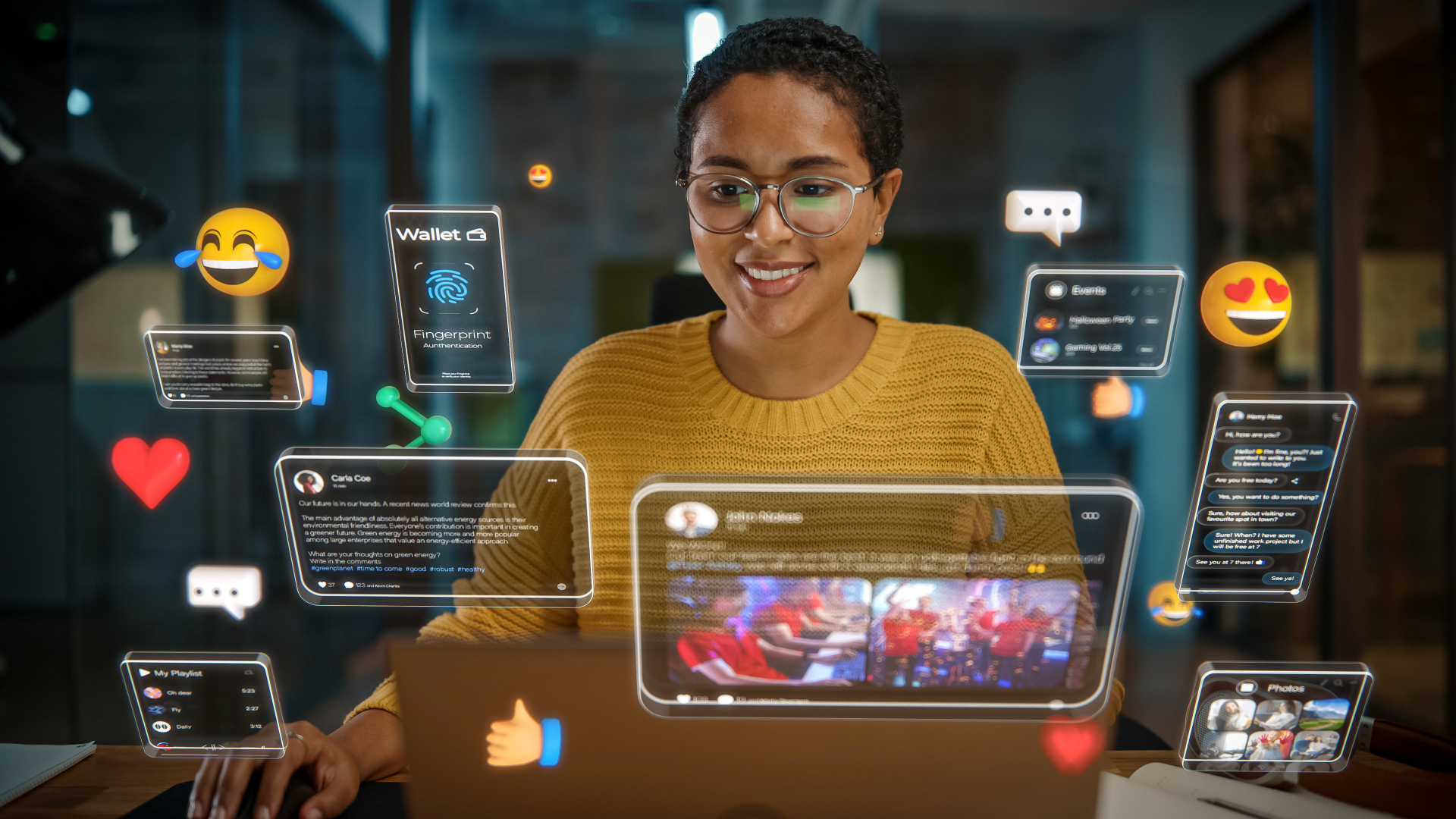In today’s digital landscape, where consumers are bombarded with more content than ever before, AI-driven content recommendations are proving to be more than just a helpful tool. They are vital for keeping users engaged.
Imagine browsing your favorite online store and seeing a carefully curated selection of items based on your past purchases. Or, picture opening your go-to streaming service and instantly seeing movies and shows you’ll love. This is the power of AI-driven content recommendations.
How AI Is Revolutionizing Content Recommendations
Think back to the early 2000s when the concept of recommendation systems began gaining traction. The first iterations, relying mainly on collaborative filtering, had limitations.
These early systems were adept at spotting general trends, suggesting what other users with similar histories enjoyed. However, they needed more sophistication to truly understand individual tastes and provide personalized recommendations.
Today, AI has fundamentally changed how this works. Rather than just looking at basic browsing or purchase history, AI digs much deeper. By leveraging sophisticated machine learning algorithms, these systems can now process vast amounts of data, analyze patient data, and identify complex patterns in user behavior.
The Power of AI in Understanding Individual Preferences

One of the biggest advantages of AI-driven content recommendations is the ability to personalize content suggestions on an individual level. Unlike earlier engines that grouped consumers based on broad similarities, AI identifies unique nuances by considering various factors such as media consumption. AI accomplishes this by considering a wide range of factors, including:
- Past purchases.
- Browsing history: Even if a purchase isn’t made, the time spent viewing certain items helps the AI understand potential interests.
- Search queries.
- Items liked or favorited.
- Social Media Activity.
- Time of Day.
- Device Type: Does the user primarily browse on their phone or a desktop? This, too, can signal preferences.
Imagine that a user frequently buys running shoes but has recently started browsing fitness trackers. An astute AI system can connect these data points. It realizes the user might be interested in expanding into other fitness-related products. AI algorithms constantly learn and adjust based on user data, ensuring that as a user’s preferences change, the recommendations remain relevant and interesting.
The Tangible Impact on Sales and User Experience
 When AI-driven content recommendations are done well, they go beyond simple suggestions. It’s about offering a genuinely valuable experience that deepens user engagement.
When AI-driven content recommendations are done well, they go beyond simple suggestions. It’s about offering a genuinely valuable experience that deepens user engagement.
Driving Revenue and Building Loyalty
In the competitive landscape of today’s digital marketplace, companies like Amazon and Netflix are proof of how effective this technology is. Studies have found staggering numbers of users rely heavily on recommendations to discover content.
Take Netflix, for example; a significant 80% of movies watched are discovered through the platform’s recommendation engine. These algorithms analyze viewing habits to directly contribute to higher revenue for content platforms.
Similarly, McKinsey reported in 2013 that product recommendations were driving a massive percentage of sales, accounting for about 35% of what consumers purchased on Amazon. This is not surprising when you consider that the use of personalized content, as noted by McKinsey, results in a 10%-15% increase in revenue. AI systems excel at understanding complex patterns that humans might miss, ultimately helping content providers effectively connect with their audiences.
AI: Solving Challenges, Amplifying Efficiency
As companies strive to streamline their operations, AI is stepping up in a major way. Artificial intelligence is helpful for the following reasons.
- Bridging the Gap for Sales Teams: In the realm of B2B, AI-driven content recommendations are game changers. They eliminate countless hours spent trying to find the right material to provide personalized treatment to customers. Research has found that sales professionals often spend more than 440 hours yearly just searching for suitable content to engage prospects and customers. To add to that challenge, Forrester points out a staggering statistic: a massive 65% of marketing material often sits unused. Implementing AI is not just about suggesting interesting movies – it’s about directly impacting a company’s bottom line.
Content Is King: Equipping Your Team with the Right Tools
With the explosion of information in the digital age, one thing’s for certain – content reigns supreme. According to Prezentor, an astonishing 95% of decisions made in B2B scenarios are directly shaped by content.
However, a considerable roadblock that companies face is not the absence of content but the inability to utilize what they have effectively. One factor at play here is that, on average, a single sales team uses close to 1,400 pieces of content in a single year. With so much material at their fingertips, ensuring your teams can readily find what’s most relevant becomes absolutely vital for success.
AI-driven recommendations ensure that your sales team is armed with the perfect pieces of content to close deals and nurture those vital customer relationships, giving them time to do what matters most—selling. AI recommendations save valuable time and energy by instantly recommending materials based on what’s proven most effective, customer profiles, or industry trends.
Examples of AI in Content Recommendations

Industry Platform/Tool How AI Is Used
E-Commerce: Amazon: Personalizes product recommendations based on past purchases, browsing history, and user ratings.
Entertainment Netflix: Recommends movies and TV shows based on viewing history, ratings, and user preferences.
Music Streaming: service Spotify creates personalized playlists, suggests new artists and tracks, and recommends music based on mood and activity.
Social Media sites: Facebook, Instagram, and Twitter personalize news feeds, suggest connections and recommend content based on user interactions and interests.
Looking Ahead: What’s Next in AI Content Curation
The evolution of AI shows no signs of slowing down. These are exciting times for anyone creating or utilizing content. AI content recommendations and AI-powered content will likely become increasingly sophisticated. Here’s a sneak peek at what the future of AI may look like:
- Deep Learning and Neural Networks: AI is going to move beyond just understanding past behavior. It’s going to start accurately predicting future needs and desires. Expect to see AI predicting future needs by analyzing massive data sets and complex behavioral patterns.
- Seamless Integration with the Physical World: Imagine walking into a store and having your phone instantly recommend items based on your known preferences. Picture trying on a pair of shoes and receiving suggestions for matching accessories through augmented reality. The future of AI is moving beyond the digital landscape to provide a more personalized experience. The real world, both online and off, will work together.
FAQs About AI-Driven Content Recommendations
What are AI-driven recommendations?
AI-driven recommendations are smart suggestions generated by sophisticated algorithms that have been designed to understand and predict a user’s interests.
Picture having a virtual assistant suggesting music you might enjoy or articles you might want to read – that’s the magic of AI-driven content recommendations. Instead of relying on broad demographic data, AI analyzes past behavior, allowing for a remarkably tailored experience that keeps users engaged.
What content can I create with AI?
AI can be used to create various forms of content, making it easier to craft engaging blog posts, scripts, emails, and much more. AI content creation tools can provide personalized suggestions and improve the efficiency of your content creation process.
However, while these tools are helpful in generating initial drafts, remember that only some can truly replicate the nuances and emotional intelligence of a skilled human writer.
What is personalized content recommendation using AI?
Think about how Netflix recommends your next binge-worthy show or how Amazon suggests products you didn’t know you needed.
Instead of recommending the same content to everyone, AI personalizes it, taking your browsing history, purchases, likes and dislikes, and other details into account, creating a more tailored experience for each user. Imagine being handed a curated list of books chosen just for you—that’s a personalized content recommendation at its best.
What are the recommendations for AI policy?
When creating AI policies, ethical considerations regarding data privacy, potential biases in algorithms, and transparency in how these systems make decisions must always be considered. AI should be developed and deployed responsibly. It has immense potential to benefit society; navigating this powerful technology’s ethical implications is important.
Summary
In today’s digital world, AI-powered content recommendations are crucial for engaging users amidst overwhelming content. Early content recommendation systems were basic, relying on collaborative filtering to suggest popular items. However, modern recommendation engines use advanced recommendation algorithms that analyze extensive data, including past purchases, browsing history, and social media activity, to provide personalized suggestions.
These AI-powered recommendations enhance user experiences by tailoring suggestions to individual preferences, significantly impacting sectors like e-commerce, streaming, and social media. For instance, platforms like Amazon and Netflix use these systems to drive sales and boost user engagement. According to McKinsey, personalized recommendations account for a significant portion of Amazon sales, illustrating the effectiveness of AI-powered content recommendations in increasing revenue.
Moreover, recommendation algorithms not only improve user interaction but also streamline sales content management by saving time and optimizing material relevance. However, ethical concerns such as data privacy and algorithmic biases must be addressed to ensure responsible use of these technologies. As AI continues to evolve, it will further integrate into both digital and physical experiences, offering even more refined and predictive recommendations.
This transformation underscores the importance of AI-powered content recommendations in shaping user experiences and driving business success.
Conclusion
When it comes to AI-driven content recommendations, it’s no longer a question of ‘if’ but ‘how well’. It’s an essential ingredient in boosting revenue, improving customer experiences, and simplifying workflows in today’s world. Remember, personalized content is king.

